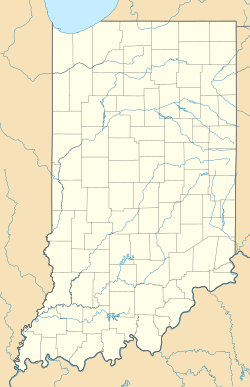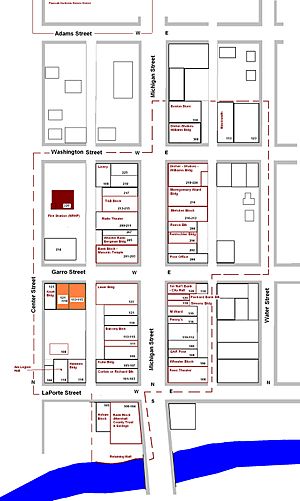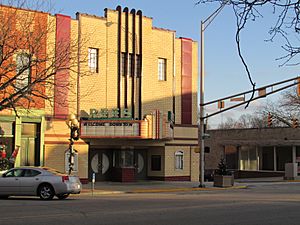Plymouth Downtown Historic District facts for kids
Quick facts for kids |
|
|
Plymouth Downtown Historic District
|
|
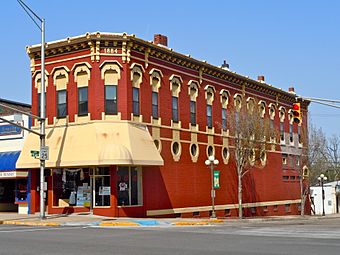
Plymouth Downtown Historic District, April 2011
|
|
| Location | Roughly bounded by Center, Washington, and Water Sts., and Yellow R., Plymouth, Indiana |
|---|---|
| Area | 15 acres (6.1 ha) |
| Built by | Jacob Ness |
| Architect | Alves O'Keefe |
| Architectural style | Colonial Revival, Italianate, Romanesque |
| NRHP reference No. | 98001524 |
| Added to NRHP | December 17, 1998 |
The Plymouth Downtown Historic District is a special area in Plymouth, Indiana. It is recognized as a national historic district. This means it has many old and important buildings.
The district includes 47 buildings and one structure that show the history of Plymouth. Most of these buildings were built between 1870 and 1940. They feature different architectural styles like Italianate, Romanesque Revival, and Colonial Revival. The Plymouth Fire Station is also in this district. It is so important that it is listed on its own! Other notable buildings include the Montgomery Ward Building (1929) and the First National Bank-Plymouth City Hall (1879, 1916).
This historic district was added to the National Register of Historic Places in 1998. It covers about four blocks of the original town plan from 1834. The town sits on the high banks of the Yellow River. The buildings are mostly made of brick or stone. They were built from about 1870 to 1960. Most of them still look much like they did when they were first built.
Contents
History of Plymouth's Downtown
When Center Township was formed in 1836, Plymouth became the county seat. At first, it was just a few log houses. The town grew slowly until railroads arrived in the 1850s.
The area's economy was based on farming. The railroads helped farmers sell their goods. This made Plymouth grow into an important business center. The Downtown Historic District shows how the town developed and became busy.
The Michigan Road was a very old road built in the 1800s. It connected Madison on the Ohio River to Lake Michigan. It passed right through Plymouth. The main shops and businesses in Plymouth grew up along this road. Today, Michigan Street is still the most important business street.
Where is the Historic District?
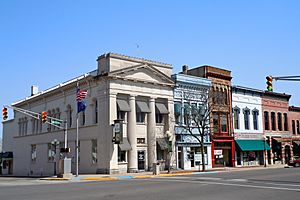
The historic district stretches along Michigan Street, which was once the Michigan Road. At the south end of the district is LaPorte Street. This street runs between the old Pennsylvania Railroad Depot and the East Laporte Street Footbridge. The footbridge crosses the Yellow River.
Garro Street cuts through the middle of the district. Just east of the district, Garro Street ends at the Yellow River. Across the river is Lincoln High School, known for its beautiful landscaping. The north end of the district is along Washington Street.
Michigan Street is wide, allowing for large sidewalks and angled parking. Most buildings in the district are two stories tall. They are usually between 30 and 40 feet high. The buildings are close together, forming a continuous line. The streets on the east (Water Street) and west (Central Street) sides are 60 feet wide. Water Street mainly has one-story shops from the 1900s.
Important Buildings in the District
Many buildings in the Plymouth Downtown Historic District are special. Here are some of them:
Buildings on West Garro Street
- 124 Post Office: This building was built in 1935. It is in the Colonial Revival style.
Buildings on West La Porte Street
- 111 - Centennial Opera House: Built in 1876, this building shows the Italianate style.
Buildings on North Center Street
- 108 House: This house from around 1870 has a Gable-front/Gothic Revival style.
- 220 Plymouth Fire Station: Built in 1875, this Italianate style building is very important.
Buildings on North Michigan Street (West Side)
- 101 - Richard Building: This building from about 1910 is in the Neoclassical style.
- 123 Lauer Building: Built in 1910, it also features the Neoclassical style.
- 201-203 Bank Block/Masonic Temple: This Neoclassical building was built in 1901.
- 205 Bergman Building: An Italianate style building from around 1890.
- 209-211 Rialto Theatre: This theater from about 1920 has a Twentieth Century Functional style.
- 213-215 T and B Block: A Neoclassical building from around 1910.
Buildings on North Michigan Street (East Side)
- 102 Rees Theatre: Built in 1940, this theater is a great example of Art Deco style.
- 120 Commercial Building: An Italianate style building from around 1885.
- 124 First National Bank: This building was built in 1879 and updated in 1916. It is in the Neoclassical style and is now the City Hall.
- 204 Rentschler Building: A Neoclassical building from about 1910.
- 206 Reeve Block: This building from about 1910 has a Twentieth Century Functional style.
- 210-212 Metsker Block: A Neoclassical building from around 1910.
- 218-224 Disher-Shakes-Williams Building: This Neoclassical building is from about 1910.


